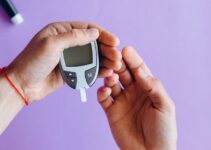I'm excited to share the incredible benefits of CBD oil for hypoglycemia. It regulates blood sugar, improves insulin sensitivity, and supports glucose metabolism. Managing hypoglycemic symptoms and balancing blood sugar levels, CBD oil offers a natural and effective solution.
Key Takeaways
- CBD oil helps regulate blood sugar levels effectively.
- Consistent use of CBD oil improves insulin sensitivity.
- CBD oil significantly improves glucose metabolism.
- Regular monitoring of blood sugar levels and mindful dietary choices are crucial in managing hypoglycemia.
Blood Sugar Regulation
As someone with hypoglycemia, I have found that CBD oil can help regulate my blood sugar levels more effectively than other treatments. Along with incorporating CBD oil into my daily routine, I have made significant changes to my dietary considerations and exercise routines. I have discovered that consuming a balanced diet with a focus on low glycemic index foods, such as whole grains, lean proteins, and healthy fats, has a positive impact on managing my blood sugar levels. Additionally, regular exercise, particularly a combination of aerobic and strength training, has been instrumental in improving my body's response to insulin and lowering my overall blood sugar levels. When coupled with the consistent use of CBD oil, these lifestyle adjustments have provided me with a more sustainable and holistic approach to managing hypoglycemia.
Insulin Sensitivity
Improving insulin sensitivity through consistent use of CBD oil, dietary modifications, and regular exercise has been key in managing my hypoglycemia. Insulin resistance, a common issue in hypoglycemia, can be mitigated through these lifestyle changes. CBD oil has shown promise in reducing insulin resistance, which allows cells to more effectively respond to insulin and regulate blood sugar levels. Additionally, modifying carbohydrate consumption has been crucial in improving insulin sensitivity. By opting for complex carbohydrates with a lower glycemic index, I've been able to minimize blood sugar fluctuations and enhance insulin function. Regular exercise also plays a significant role in increasing insulin sensitivity by helping cells use glucose more efficiently. These combined efforts have not only stabilized my blood sugar levels but have also improved my overall well-being.
Glucose Metabolism Support
Using CBD oil has significantly improved my glucose metabolism, aiding in better blood sugar regulation and overall health. The support it provides for glucose metabolism has positively impacted my energy levels and weight management. CBD oil has helped me maintain stable energy levels throughout the day, reducing the fluctuations often experienced with hypoglycemia. This has allowed me to engage in physical activities without feeling fatigued. Additionally, the improved glucose metabolism has contributed to better weight management, as it has helped me maintain a healthier body composition. The table below summarizes the effects of CBD oil on glucose metabolism support.
| Effects of CBD Oil on Glucose Metabolism Support |
|---|
| Improved Energy Levels |
| Better Weight Management |
Hypoglycemic Symptoms Management
My experience with CBD oil has led to a notable reduction in hypoglycemic symptoms, particularly in managing sudden drops in blood sugar levels. In addition to using CBD oil, I've found the following strategies helpful in managing hypoglycemic symptoms:
- Regular monitoring: Checking blood sugar levels frequently to catch any sudden drops.
- Healthy snacking: Incorporating small, healthy snacks throughout the day to maintain stable blood sugar levels.
- Dietary adjustments: Making mindful choices about the types and quantities of carbohydrates consumed.
- Exercise routine: Engaging in regular physical activity to help regulate blood sugar levels.
- Emergency preparedness: Carrying glucose tablets or gel for quick treatment if hypoglycemic symptoms occur.
Balancing Blood Sugar Levels
In managing hypoglycemia, I focus on balancing my blood sugar levels through mindful dietary choices and regular physical activity. Dietary recommendations play a crucial role in maintaining stable blood sugar levels. I prioritize complex carbohydrates like whole grains, fruits, and vegetables, as they provide a steady release of glucose. Additionally, including lean proteins and healthy fats in my meals helps prevent rapid spikes and drops in blood sugar. Portion control is also important to avoid overloading my system with glucose. Furthermore, lifestyle changes such as regular exercise help improve insulin sensitivity, allowing my body to better regulate blood sugar levels. By combining these dietary and lifestyle adjustments, I can effectively manage hypoglycemia and maintain a more stable and balanced state of health.
Frequently Asked Questions
Can CBD Oil Be Used as a Primary Treatment for Hypoglycemia, or Should It Only Be Used as a Supplement to Traditional Medications?
I believe CBD oil should be used as a supplement to traditional medications for hypoglycemia, rather than as a primary treatment. It can aid in symptom management and prevention, but it's important to rely on established medications for primary treatment. Incorporating CBD oil into a comprehensive treatment plan under medical supervision may offer additional benefits, but it should not replace traditional medications for managing hypoglycemia.
Are There Any Potential Side Effects or Interactions Between CBD Oil and Hypoglycemia Medications?
Potential interactions between CBD oil and hypoglycemia medications should be carefully considered. It's essential to consult a healthcare professional before combining them, as CBD can affect how the body metabolizes certain medications. Dosage recommendations and prevention methods are crucial to minimize risks. Researching CBD oil's impact on hypoglycemia and understanding potential interactions is key to making informed decisions about its use alongside traditional medications.
How Long Does It Typically Take to See Results When Using CBD Oil for Hypoglycemia Management?
Typically, it takes time to notice potential benefits from using CBD oil for hypoglycemia management. While some may see results sooner, it's important to give it a chance to work. It's essential to be patient and consistent with use. Monitoring blood sugar levels and consulting a healthcare professional can provide insight into the timeframe for results. Individual responses may vary, so it's important to stay informed and observant.
Are There Specific Dosages or Forms of CBD Oil That Are Recommended for Hypoglycemia, or Is It a Personal Preference?
For hypoglycemia, recommended dosages and alternative forms of CBD oil can vary based on individual needs. It's not just a personal preference; it's about finding what works best for managing your specific symptoms. Some may prefer tinctures, while others find relief with capsules or edibles. It's important to consult with a healthcare professional to determine the right dosage and form for your condition.
Can CBD Oil Be Used to Prevent Hypoglycemic Episodes, or Is It Primarily Used for Managing Symptoms Once They Occur?
I believe CBD oil can provide preventive benefits for hypoglycemic episodes. Research suggests that CBD may help regulate blood sugar levels and improve insulin function, potentially reducing the risk of hypoglycemia. While it's commonly used for managing symptoms, its long-term effects on preventing hypoglycemic episodes are promising. It's important to consult a healthcare professional to determine the appropriate dosage and form for individual needs.
Conclusion
Overall, CBD oil shows promise in providing potential benefits for hypoglycemia. It has been shown to help regulate blood sugar, improve insulin sensitivity, support glucose metabolism, and manage hypoglycemic symptoms. By incorporating CBD oil into a healthy lifestyle, individuals with hypoglycemia may find relief and better management of their condition. As always, it's important to consult with a healthcare professional before adding any new supplements to your routine.




